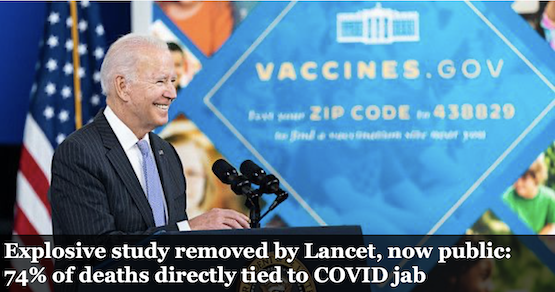Last year, WorldNetDaily’s Bob Unruh ranted that “A new study, conducted by respected medical researchers and published in The Lancet, a renowned medical journal, indicated that the COVID shots themselves actually killed people – and the study now has been killed”; that study wildly claimed that COVID vaccines “directly caused or significantly contributed to up to 74% of those deaths” in a group of 325 people whose autopsies were reviewed. In fact, that study was not published in The Lancet — it appeared on a preprint server of a Lancet-linked publication where studies can be posted prior to peer review, and it was never accepted for publication. Further, those who conducted the study are not “respected medical researchers” — they include notorious COVID misinformers like Peter McCullough, Harvey Risch, Roger Hodkinson William Makis and Paul Alexander. But having gotten that misinformation out there, one actual researcher lamented that the claims in this “zombie paper” will become part of the discourse despite its having been discredited and retracted.
Indeed, this zombie paper has risen from the dead, and another journal was somehow talked into actually publishing it. This time, WND farmed out the misinformation to highly discredited Gateway Pundit writer Jim Hoft — who was recently busted for filing a sham bankruptcy to avoid being held accountable for his election fraud lies — for a June 24 article:
A previously censored paper from The Lancet has now undergone peer review and is available online.
The study, titled “A Systematic Review of Autopsy Findings in Deaths After COVID-19 Vaccination,” analyzed 325 autopsy cases and found that a staggering 73.9% of deaths were either directly due to or significantly contributed to by the COVID-19 vaccination.
The paper’s lead author, Dr. Nicolas Hulscher, faced significant opposition in bringing these findings to light. After initially being downloaded over 100,000 times, The Lancet removed the paper within 24 hours, according to Dr. William Makis.
Hoft gave Makis plenty of space to play victim:
In a post on X Friday, Dr. William Makis shared the exciting news.
“BREAKING NEWS: Our LANCET CENSORED Paper is now peer reviewed and available online!” Makis wrote on X.
“Incredible perseverence [sic] by first author Nicolas Hulscher who didn’t give up after LANCET pulled our paper within 24 hours after 100,000s of downloads for no legitimate reason. Big pharma put the squeeze on The Lancet but has failed to stop us.”
“Our paper was delayed by one year, and those actions of CENSORSHIP and CANCELLATION led to many deaths that could have been prevented. This paper could be a game changer,” Makis added.
Yeah, not so much. Critics originally found that the study did not factor in other medical conditions as possible contributors to death; one critic pointed out that the paper is “an astoundingly ridiculous analysis and conclusion and I believe one does not have to be a scientific or medical expert to find the major flaws.”
It’s not clear what, if anything, was changed in the paper to get it published in a different publication, or how that supposed peer review for the current version of the paper was conducted. It’s likely not much changed, given that it has given the same fate: Forensic Science International, the journal that published the current version of the study, retracted it earlier this month:
Members of the scientific community raised concerns about this Article-in-Press following its posting online. The concerns encompassed.
• Inappropriate citation of references.
• Inappropriate design of methodology.
• Errors, misrepresentation, and lack of factual support for the conclusions.
• Failure to recognise and cite disconfirming evidence.
The concerns were shared with the authors, who prepared a response and submitted a revised manuscript for consideration by the journal. In consideration of the extent of the concerns raised and the responses from the authors, the journal sent the revised manuscript to two independent peer-reviewers. The peer-reviewers concluded that the revised manuscript did not sufficiently address the concerns raised by the community and that it was not suitable for publication in the journal. The authors disagree with this withdrawal and dispute the grounds for it.
WND is now 0-for-2 on this bogus paper, and it has not reported on the second retraction. Still, the zombie paper lives on.
